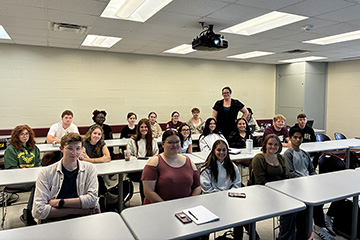Explore our programs
In the Department of Philosophy, Anthropology and Religion, we engage in critical thinking about fundamental questions of humanity. We believe that learning how to think is more important than learning what to think. We seek wisdom for a changing world, and we learn from those with whom we disagree. We examine patterns of diversity and inclusion and encourage ethical citizenship in a global society. We cultivate intellectual skills for productive careers in a variety of fields.
Philosophy
Philosophy is the study of fundamental questions such as: Is there objective truth, or is everything just relative? Do we have free will? Is the mind or soul more than the brain? Is morality a matter of opinion? Philosophers examine such questions systematically and critically. Studying philosophy is a great way to develop marketable skills in critical thinking, creative problem-solving, and effective writing.
Anthropology
Anthropology is the study of people through time and space. How do diverse cultures address human needs? What can we learn about human origins, diversity, and health from forensics and archaeology? You’ll study archaeology, cultural anthropology, linguistic anthropology, biological anthropology and applied anthropology to prepare for a variety of careers in this dynamic field. You can major in Anthropology, to earn a bachelor’s degree, or pursue a minor in Anthropology.
Religion
The study of religion examines how different traditions understand the meaning of life, or make sense of human suffering. What roles do religion and spirituality play in politics social justice, and culture? Its analysis includes historical, anthropological, sociological, and textual approaches. It regards religion as an integral component of human societies, whose study is essential to a balanced education.
Degrees and certificates
{{undergraduate.Name}}
{{undergraduateCertificate.Name}}
{{graduate.Name}}
{{graduateCertificate.Name}}
{{doctorate.Name}}




